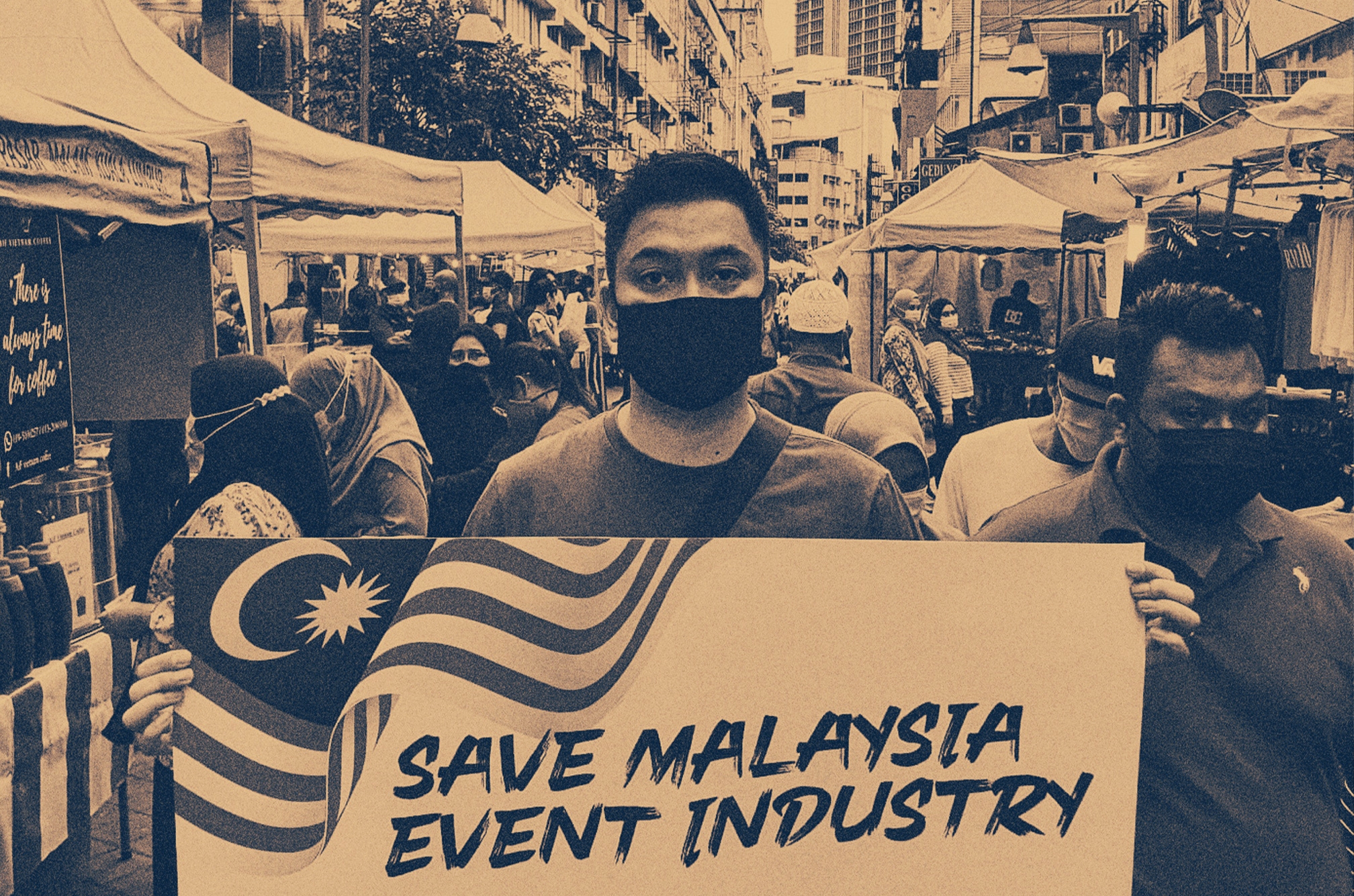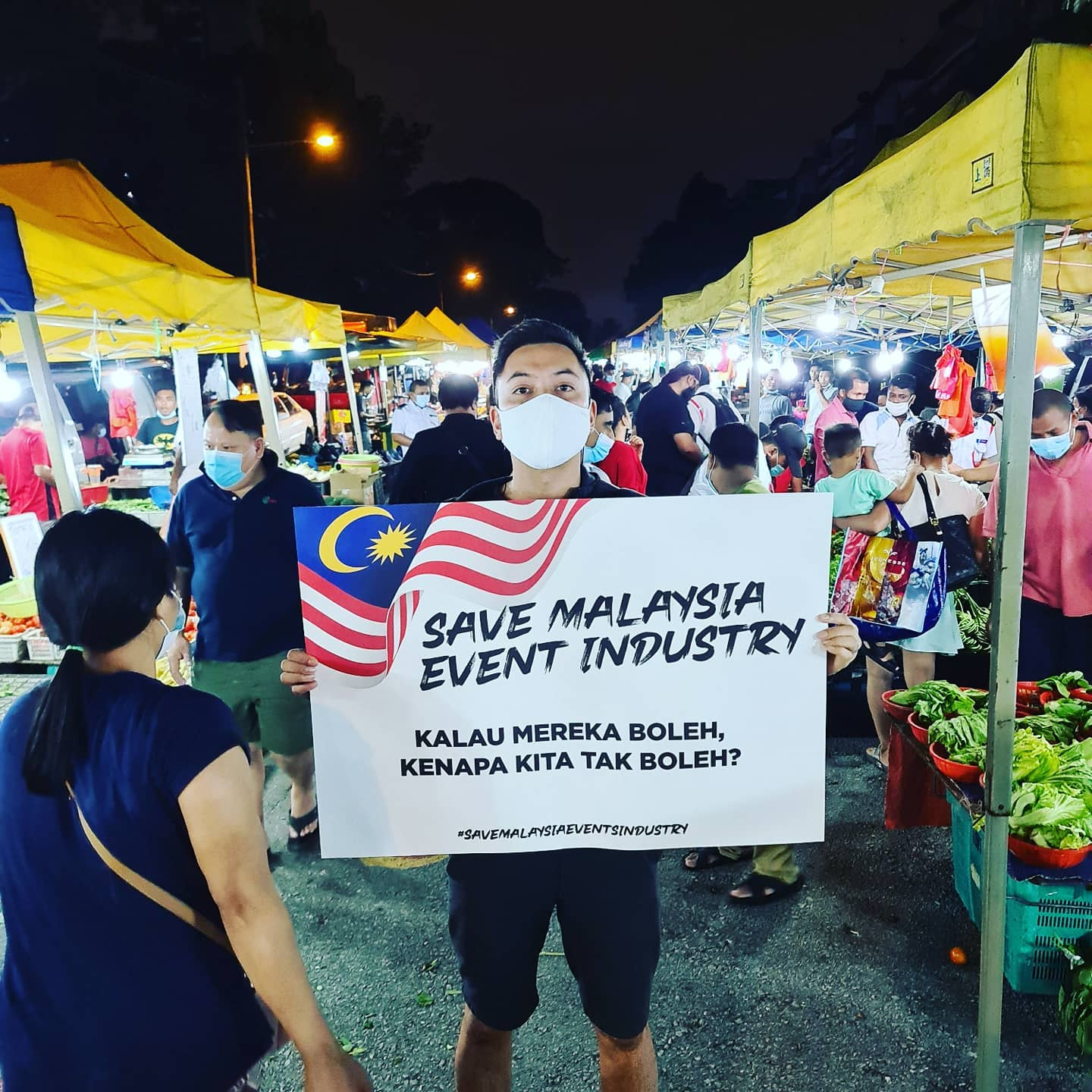 Features
Features
Who will save Malaysia’s event industry?
Livescape CEO Iqbal Ameer stages one-man protests at local night markets
The pandemic has exacerbated every inequality in our global society: within countries, between countries, between groups of people with different socioeconomic, gender and racial backgrounds. Loss — of income, of job security, of shelter, of access to healthcare (if even existent pre-pandemic), of quality of life, and of life itself — is disproportionately more severe for those that have already had less to begin with.
In October, UK chancellor Rishi Sunak suggested in an ITV News interview that people working in the arts sector should simply retrain and find new jobs, and while the UK government had offered a rescue package for the country’s arts and culture sector earlier in July, the funds were simply not enough for workers in the industry to survive the pandemic. People outside of the sector often have a simplistic view of the entertainment industry; what is often underrepresented and dismissed under the carpet where talent stands, is the labour of promoters, event organizers, venue owners, audio engineers, photographers, videographers, caterers, makeup artists.
Malaysia’s Conditional Movement Control Order (CMCO) was announced in May, with the goal of reviving the country’s economy while adhering to standard operating procedures like social distancing, and has been implemented, redefined and reimplemented over the months. But what part of the country’s economy did the government want to revive? Which industries did the government consider essential, and which industries were considered otherwise?
Iqbal Ameer has been staging one-man protests at local pasar malam (night markets) since December 14. Inspired by local DJ Elvis DjNaughty, the Livescape CEO holds a large sign that says “SAVE MALAYSIA EVENT INDUSTRY” at different night markets in Kuala Lumpur. As he stands masked and defiant, the background of the pasar malam illustrates what he vocalizes on Instagram: the restaurants, malls, rubber factories, car showrooms, food courts and pasar malam that are operating are public gatherings too — public gatherings that aren’t following the guidelines of the CMCO. If they’re allowed to operate, why can’t the events industry?
“While I personally applaud people who have taken charge of their situation and pivoted to set up other businesses (@livescapeasia has pivoted too) — some people can't do that. They're not cooks. They didn't spend years and years of building their businesses and perfecting their craft to join the thousands of other people who have also started to sell F&B. We are talking about the people behind the scenes that work day and night to get an event up and running for you. . . .We aren't 'non-essential',” reads one of Ameer’s captions.
What’s essential, and what isn’t? I reached out to Ameer for more context and perspective.

“Pasar malams have been allowed to operate during the CMCO lockdown as these are small independent businesses and they need to be able to operate in order to survive. I personally support any initiative made by the government in working proactively to get businesses up and running, but the essence of a pasar malam is still an event if you think about it. It is done in an open space, has social-distancing measures in place, different vendors working and operating in one space and it is open to the public. These elements are identical to many events in the event industry, but yet we are not allowed to operate. The events industry is not only subjected to higher SOPs and accountability, but what is worse is we are not given the green light to operate."
He continued: “To me, all jobs are essential because they get the economy going and the government should not be branding jobs as essential or 'non-essential'. Instead, priority should be placed on what is most important to the economy. We feel that as a key member of the events industry and someone who was personally very affected by the pandemic, our voice should be heard. We are extremely capable as event organisers, to create well-organized SOP compliant events, placing measures for health and safety and ensuring that attendees come in an orderly manner, as that is our expertise. Our level of capability should be taken into account, and unlike regular mass gatherings or sporting events, our industry would be less of a risk to be allowed to start up again.
Before the pandemic, Iqbal Ameer wrote in a LinkedIn piece that the ideal recipe for a thriving events industry in Malaysia was “an exciting mix of government, support, domestic and international tourism, an extremely supportive private sector and a ticket-buying culture from Malaysian fans”, and vented his frustrations and theories about how and why Malaysians haven’t been supporting their own events industry. What about now? Have attitudes changed since the pandemic?
“We’ve definitely seen a change here,” Ameer responds. “Malaysians are starting to learn to support each other during this time of struggle, especially in terms of supporting local businesses. I think the current situation has allowed Malaysians to embrace locally made products and local artists, and being very active on social media has allowed for a lot more exposure to local brands this year. We have a #kitajagakita theme going on, which means ‘let’s take care of each other’. ICEBOX, our all-immersive, interactive drive-through experience themed drive-throughs was our latest project, with the entire experience taking place from the comfort of your own car. The reception was great as the public was craving for new experiences which were compliant with all the SOPs.”
In a recent Instagram caption, he holds on with hope: “Now - more than ever is the perfect opportunity for the events industry to show Malaysians what we are truly made of and what we can offer.”
Malaysia’s just procured 6.4 million doses of AstraZeneca’s coronavirus vaccine, reports Reuters, but the virus has seemingly found a way to further ruin the holidays with its new variant found in the UK over the weekend. Early data suggests that the new strain could be up to 70% more transmissible. Taiwan’s also just reported its first domestic case in eight months, and Thailand’s just recorded its worst outbreak yet.
I can choose between ending on a hopeful note and a depressing one. Both options are futile ways of romanticizing the future, because we know nothing about it. All we know is that amongst the growing pile of bad news, there are some cracks for light to slip in, like this story of an events-CEO staging a one-man protest at night markets in Malaysia, believing that this is an opportunity for change.


